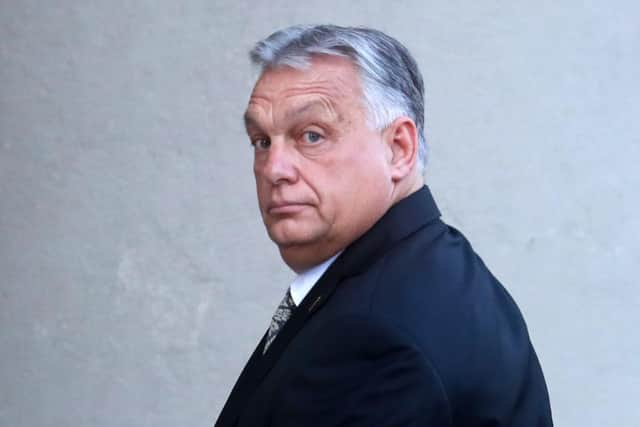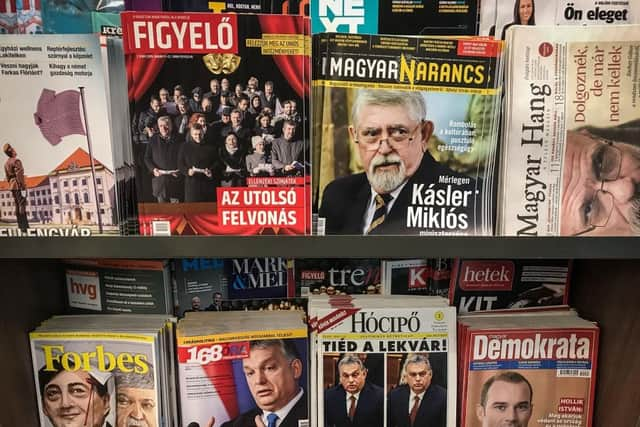How a European nation in Hungary has shut down freedom of the press and introduced 'climate of fear'
When Hungary’s new Media Authority was created in July 2010, the country’s prime minister, Viktor Orbán, had been in power for just two months.
In his second stint as leader – Mr Orbán had previously held the role from 1998 to 2002 – he lost no time in cracking down on the organisations which oversaw Hungary’s media, replacing the former regulatory bodies with a single entity. The five members of the Media Council, which sits within the Media Authority and enforces the government’s media laws, are handpicked by the government.
Advertisement
Hide AdAdvertisement
Hide AdNow, 14 years on, 80 per cent of the media in Hungary is owned by companies with strong links to the government, with many previously independent outlets having been shut down in the intervening period.


A new report published this week by Human Rights Watch (HRW) reveals a “climate of fear and intimidation” in Hungary where state media acts as a mouthpiece for the government – and independent journalists are turned away from government press conferences. In some cases, they have had their devices infected with spyware surveillance software.
“I can’t really work as a journalist,” says Istvan Devenyi, an editor at independent weekly political newspaper Magyar Hang. “I don’t get responses, not from [Orbán’s ruling party], Fidesz, not from government, not from public institutions. We just don’t get answers to questions.”
In December, Hungary’s government passed a new law, which means that independent media outlets that receive foreign funding, including from the EU, could be officially labelled as “foreign agents”. The move opens up independent media to even more vulnerability to smear campaigns by the government.
Over the past 14 years, Hungary has witnessed the closure of a number of outlets not deemed as being close to Fidesz, in a series of moves by the authorities which the UN has branded “distortionary practices”.


“The clear objective of hollowing out media freedom is to prevent the public from knowing what the government is doing or holding it to account,” said Hugh Williamson, Europe and Central Asia director at HRW. “Independent journalism is a cornerstone of democracy and crucial for holding governments to account for power abuses.”
According to Mertek Media Monitor, a Hungarian non-governmental media monitoring organisation, between 2018 and 2021, the Media Council awarded 75 per cent of all tenders to local radio stations that serve Fidesz’s interests.
HRW said the European Union, which last year adopted the European Media Freedom Act, a set of rules to protect media pluralism and independence in the EU, should “urgently consider” triggering infringement proceedings on Hungary on the basis of the Media Freedom Act.
Advertisement
Hide AdAdvertisement
Hide AdLast year, the EU Commission Rule of Law’s 2023 Media Pluralism Monitor (MPM) changed its previous assessment of the independence and effectiveness of the Media Authority from medium to high risk, also referring to the authority’s “openly discriminatory” decision making.
This comes after in 2018, the EU triggered article seven against Hungary to determine whether there is a “clear risk” of serious breach of EU fundamental values of rule of law, civil liberties, and democracy. However, there has been little progress, something HRW says needs to be “moved forward urgently”.
Dr Paolo Cavaliere, lecturer at the University of Edinburgh Law School, said the introduction of the Media Freedom Law in the EU was key, where the bloc is taking an interest in not just the commercialisation of the media industry, but of freedom of expression and speech.
"The most interesting development here is that this can be interpreted as a tipping point of a 40-year-long trajectory where the EU is taking more of a political and legal responsibility for the democratic impact of the media sector, where the value of pluralism is increasingly understood in a more holistic, multifaceted way instead of just being a matter of competition,” he said.
He described the situation in Hungary, where he lived for two years from 2011, as “grim”.
“It’s really bad at the moment,” he said. “It’s been declining. I remember local colleagues worrying then about what was happening and it has been getting worse ever since. We have seen this coming for several years now, but the extent to which this is still happening really amazes me.”
He pointed to earlier rulings made by the European Court of Human Rights where he warns “enforcement has been far from perfect”. He said the bloc may find it difficult to force Hungary to comply.
Europe has already taken action against Hungary over the introduction of laws which erode LGBTQ+ rights in the country, but there has been little movement on the situation. European Commission (EC) president Ursula von der Leyen has branded the “anti-propaganda” law a “disgrace”, referring it to the EU’s Court of Justice in July 2022 after initially raising concerns a year earlier through a letter of formal notice. A total of 15 EU countries, plus the EC, have joined the legal action, saying the legislation violates the fundamental rights of LGBTQ+ people.
Advertisement
Hide AdAdvertisement
Hide AdDr Cavaliere said: “This is a complete different procedure, which opens a new landscape and new prospects that the Hungarian government may find it difficult to navigate the awkward questions as it has done up until now – or it could be a complete train wreck for the EU and the whole procedure could go not how they have hoped.
“There is no precedent. This is one of the things where law and politics intertwine in ways that makes it very difficult to predict how things are going.”
Comments
Want to join the conversation? Please or to comment on this article.
